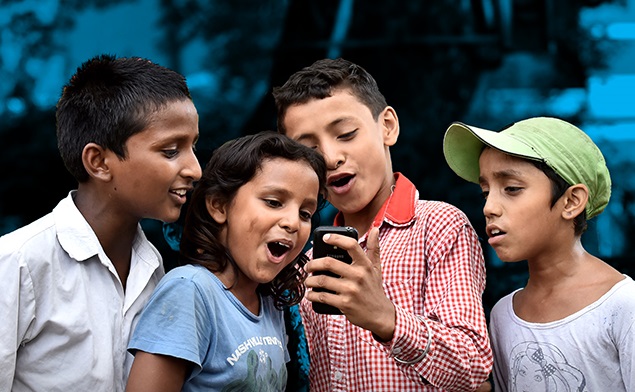Internet is a great educational tool but hides huge risks, Unicef warns
One third of the users around the world are minors, the newest report of the agency for cihldren explains. “Many have a digital footprint before they can even walk or talk”.
NEW YORK · 12 DECEMBER 2017 · 15:43 CET

One third of the internet users in the world are minors. This is good news but can also be bad news, Unicef says in its “The State of the World’s Children 2017” report.
“Digital technology can be a game changer for disadvantaged children, offering them new opportunities to learn, socialize and make their voices heard – or it can be yet another dividing line. Millions of children are left out of an increasingly connected world”, the UN agency explains.
Youth (ages 15-24) are the most connected age group at the moment. But “children are accessing the internet at increasingly younger ages. In some countries, children under 15 are as likely to use the internet as adults over 25”.
This means that, “from photos posted online to medical records stored in the cloud, many children have a digital footprint before they can even walk or talk”.
It is true that the growing connectivity is an opportunity to have a better access to information, education (“especially in remote regions and during humanitarian crises”) and communication.
But researchers acknowledge that “excessive use of digital technology can contribute to childhood depression and anxiety”.
SEXUAL ABUSE ONLINE AND OFFLINE
Unicef warns about the severe risks for children who access internet with no parental control. “Predators can more easily make contact with unsuspecting children through anonymous and unprotected social media profiles and game forums”. New crimes include “live streaming of child sexual abuse”, the agency explains.
In this alarming context, Unicef calls big internet companies to “take steps to prevent their networks and services from being used by offenders”.
EUROPE VS AFRICA
The report also shows the geographical inequality when it comes to access to the internet. In Africa, 60% of the minors have no access to internet. In Europe, this percentage falls to only 4%. Globally, 346 million young people have no access to internet.
English is the language that dominates the digital world at the moment: 56% of websites are in this language.
Download the full “The State of the World’s Children 2017” report here.
Published in: Evangelical Focus - life & tech - Internet is a great educational tool but hides huge risks, Unicef warns
